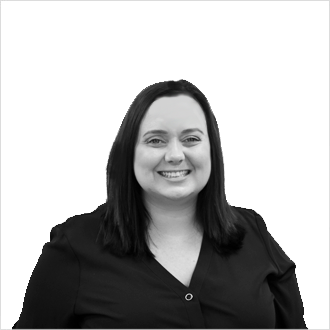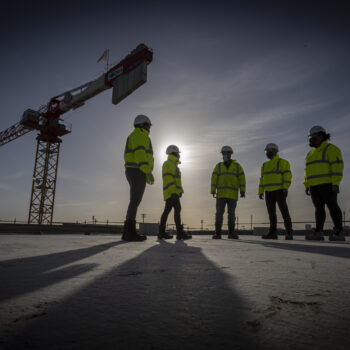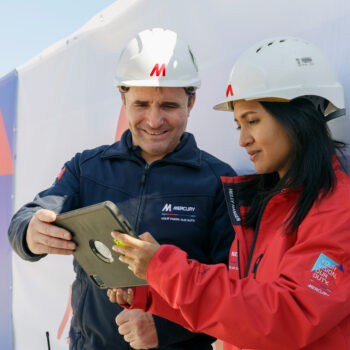Aisling Goff
Position: QA Manager, Enterprise Data Centres
Time with the Company: 8 Years
Tell us a bit about yourself and your role and background?

I interviewed for Mercury the day after my 21st birthday, so I have grown up with the company. I studied an arts degree as my undergraduate and was originally set on doing my HDip and going into teaching. I joined Mercury in the Summer of 2011 to fill a gap until I started the HDip. I began as a QA admin in Intel on the Fab14 BaseBuild project. It was such a big team. Mercury had a really strong staff on the project and I learned a lot from them. I ended up staying out in Intel on that project for a year and a half and then decided to go back to college. The big decision for me at the time was whether to do an engineering degree or a master’s in business management. I ultimately decided to go down the management route and I chose to do a business management master's in NUI Maynooth which was convenient as I was working on the Intel site in Leixlip closeby.
Since joining Mercury, you’ve moved up quite significantly, becoming a manager. Tell us about your experience with this so far?
The best thing about Mercury is that they’ve always given me the opportunity to move up. The support has always been there from day one. When I looked into going back to college, there was no issue. They put me through the master's degree. I had to go into college for 2 days a week for a couple of months in the evening, which was never an issue. Whatever research I needed to do internally, I was given all the help that was required. The focus of my master’s was on Mercury’s adoption of BIM. I was heavily supported by Mercury with this and there was great buy in from Management.
Later when I went out to Sweden for a €150 million Data Centre project, I got to a stage where it was either sink or swim. Sweden is a very equal society, so there was strong support for having women on site. My role in Sweden stepped up massively there. When I subsequently moved to Amsterdam, I was promoted from a QA Admin to a QA Manager on the AMS 15 project. This was my first step up. Then in 2017, I was promoted to the role of Regional QA Manager, looking after the quality aspects of three projects. I have most recently been promoted to the Business Unit QA Manager role.
You studied a master's since you’ve joined Mercury and most recently have begun doing the leadership development programme. Tell us about that.
The master's was a great opportunity to learn to apply general management theory to the construction industry and different tasks. The different characters and people in the master's taught me how to react differently to different people in different situations.
Being accepted onto Mercury’s Leadership Programme was a big compliment for me. When asked was I interested of course it was a yes. I appreciate that it was offered to me and I respect that they offered it to someone that they believe will contribute to the future of the business.
As a QA Manager, what’s a typical day for you like?
QA has always been a function in Mercury but the focus on the role has increased over the last number of years with QA becoming a far more active function over the duration of projects. My team has grown over the last few years. There are a lot of new employees now who have joined, which is great because they grow into the company, and where those people have previous experience, we get a different opinion and outlook which allows us to learn new ways of doing things from other places.
The hardest thing I have had to learn is to step back and try not to micro-manage, which I can be a bit of a demon for. A major learning curve for me has been learning to manage people instead of just doing everything myself.
The management master's was particularly useful in developing these skills. I was with a group of mostly mature students and the biggest thing I learned was how to communicate with people at different levels. I would have been the least experienced member of our project team at the time, so it gave me a great opportunity to watch how they conducted themselves and communicated and I ultimately ended up learning a lot from them.
What do you find most challenging about the role?
The most challenging thing is learning to build and manage a team. This can be particularly challenging when working across different regions. Talking to someone on the phone or over email is a lot different and much more challenging than when you’re standing right in front of them. It can be harder to motivate someone when you aren’t face to face.
What do you find most rewarding about the role?
The best feeling is always when we achieve something – it’s nice when we can walk around the project and say, ‘we’re really proud of this’. It’s great when the team have worked really hard and you can turn around and tell them ‘well done, guys'.
One example of this is a project last year where we carried out the fit out of 8 data halls. The first phase was very difficult, and we struggled to get through some of these. The team put in a great effort and ended up bringing the second phase of the project to a close one day early. One day may not seem like a lot, but when that effort has gone in, it is massive to be able to turn around and tell your team; ‘Well done, we’ve now signed the final acceptance cert with the client, pat yourselves on the back’.
The second example is a more personal story. Two years ago, a new graduate joined and was reporting into me, fresh out of college and with no experience of the construction industry. She worked alongside me for a year and then we put her in a QA Lead role in London which was a very big step up right out of the bat. Watching her step into the role has been great. She is running a fantastic job over there and has handed over areas of the project completely snag free. Watching her develop and grow into the role and watch the mutual respect between her and her team is incredible. Watching her progress has been really amazing.
What advice would you give someone wanting to pursue a career in Quality Management or Construction generally?
A positive attitude is a massive strength. The ability to talk to and learn from other people and understand that everyone has a different set of skills is also really important. The more we work together, the more we’re going to achieve and learn to take the hard days with the good days and get the job done for our clients.


